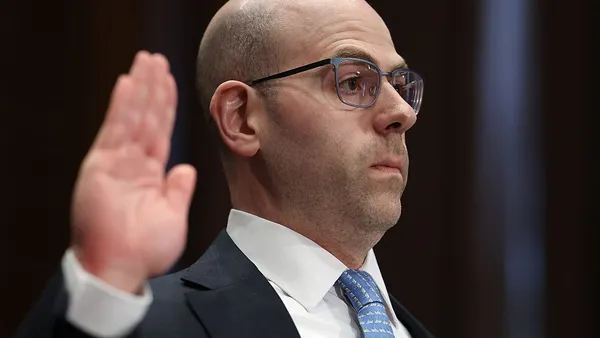The Federal Deposit Insurance Corp. has extended the public comment period for its proposed rule on recordkeeping for banks’ third-party accounts by 45 days, the agency said Monday.
The proposal, published in September, aims to address risks associated with certain third-party arrangements and protect depositors, according to the FDIC. A 60-day comment period was set close on Dec. 2, but the agency received requests to extend it. After reviewing those, the FDIC thought extending the comment period — to Jan. 16 — would be “appropriate” for parties to analyze the proposal.
“An extension of the comment period will provide additional opportunity for the public to prepare comments to address the matters raised by the proposed rule,” the FDIC said.
Following the failure of middleware provider Synapse, the FDIC proposed a rule to bolster recordkeeping for bank deposits received via third parties and non-bank entities, which accepted those funds on behalf of customers and businesses.
Fintech Synapse, which worked with several banks and non-bank companies, filed for bankruptcy in April, disrupting consumer access to funds due to recordkeeping discrepancies and highlighting the inherent risks in custodial deposit accounts, the FDIC noted. Many consumers believed funds were FDIC-insured, suggesting a lack of understanding around insurance limitations, while partner banks struggled to determine ownership of deposited funds, the FDIC noted.
A recent report from law firm Troutman Pepper identified a $65 million to $95 million shortfall between bank-held funds and amounts owed to fintech end users, with unclear responsibility for making customers whole.
The proposed rule “is an important step to ensure that banks know the actual owner of deposits placed in a bank by a third party such as Synapse, whether the deposit has actually been placed in the banks, and that the banks are able to provide the depositor their funds even if the third party fails,” FDIC Chairman Martin Gruenberg said in a statement in September when the rulemaking was published.
He added that the proposal would strengthen the FDIC’s ability to make deposit insurance determinations and, when required, pay the deposit insurance if the bank fails.
Some stipulations of the proposed rule include that banks maintain records identifying beneficial owners and their account balances, third-party record-keeping arrangements ensuring direct, continuous access to records, unrestricted access during a business interruption or bankruptcy, and annual independent validation of record accuracy.
The proposed rule also requires banks to complete an annual compliance certification, which must be submitted to the FDIC and the appropriate federal banking agency. Additionally, regardless of whether custodial account records are maintained by the bank or through a third party, daily reconciliation of account balances should be conducted along with a potential examination of third-party deposit services.
Synapse’s bankruptcy revealed problems with record-keeping and faulty account ledgering. Since records might currently be split between banks and fintechs, there is a need for a single source of truth in account records, according to Alexandra Steinberg Barrage, a partner at Troutman Pepper and a former FDIC executive.
The FDIC wants banks to maintain primary records to prevent lengthy delays in accessing funds during either bank or fintech failures, she said last month.
“At the end of the day, the FDIC is like, ‘We have a job to do. Our statutory mandate is to make sure depositors are paid based on the limits, but our ability to do that is only as good as the records that either the fintech or the bank keep,’” Steinberg Barrage said at the time. “And now they're saying this proposal, at a minimum, it needs to be the bank, it cannot only be within fintech.”













